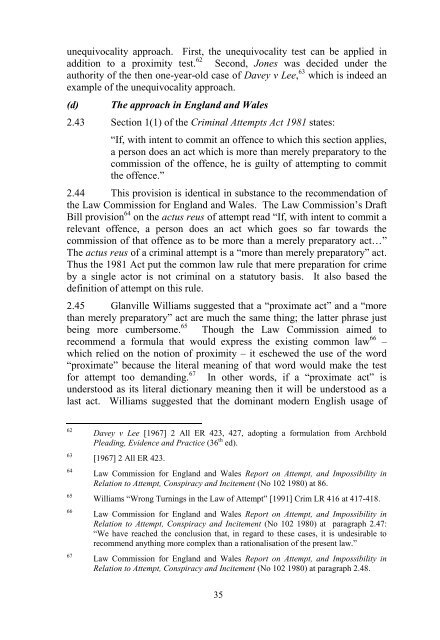Consultation Paper on Inchoate Offences - Law Reform Commission
Consultation Paper on Inchoate Offences - Law Reform Commission
Consultation Paper on Inchoate Offences - Law Reform Commission
You also want an ePaper? Increase the reach of your titles
YUMPU automatically turns print PDFs into web optimized ePapers that Google loves.
unequivocality approach. First, the unequivocality test can be applied inadditi<strong>on</strong> to a proximity test. 62 Sec<strong>on</strong>d, J<strong>on</strong>es was decided under theauthority of the then <strong>on</strong>e-year-old case of Davey v Lee, 63 which is indeed anexample of the unequivocality approach.(d)The approach in England and Wales2.43 Secti<strong>on</strong> 1(1) of the Criminal Attempts Act 1981 states:“If, with intent to commit an offence to which this secti<strong>on</strong> applies,a pers<strong>on</strong> does an act which is more than merely preparatory to thecommissi<strong>on</strong> of the offence, he is guilty of attempting to committhe offence.”2.44 This provisi<strong>on</strong> is identical in substance to the recommendati<strong>on</strong> ofthe <strong>Law</strong> Commissi<strong>on</strong> for England and Wales. The <strong>Law</strong> Commissi<strong>on</strong>‟s DraftBill provisi<strong>on</strong> 64 <strong>on</strong> the actus reus of attempt read “If, with intent to commit arelevant offence, a pers<strong>on</strong> does an act which goes so far towards thecommissi<strong>on</strong> of that offence as to be more than a merely preparatory act…”The actus reus of a criminal attempt is a “more than merely preparatory” act.Thus the 1981 Act put the comm<strong>on</strong> law rule that mere preparati<strong>on</strong> for crimeby a single actor is not criminal <strong>on</strong> a statutory basis. It also based thedefiniti<strong>on</strong> of attempt <strong>on</strong> this rule.2.45 Glanville Williams suggested that a “proximate act” and a “morethan merely preparatory” act are much the same thing; the latter phrase justbeing more cumbersome. 65 Though the <strong>Law</strong> Commissi<strong>on</strong> aimed torecommend a formula that would express the existing comm<strong>on</strong> law 66 –which relied <strong>on</strong> the noti<strong>on</strong> of proximity – it eschewed the use of the word“proximate” because the literal meaning of that word would make the testfor attempt too demanding. 67 In other words, if a “proximate act” isunderstood as its literal dicti<strong>on</strong>ary meaning then it will be understood as alast act. Williams suggested that the dominant modern English usage of626364656667Davey v Lee [1967] 2 All ER 423, 427, adopting a formulati<strong>on</strong> from ArchboldPleading, Evidence and Practice (36 th ed).[1967] 2 All ER 423.<strong>Law</strong> Commissi<strong>on</strong> for England and Wales Report <strong>on</strong> Attempt, and Impossibility inRelati<strong>on</strong> to Attempt, C<strong>on</strong>spiracy and Incitement (No 102 1980) at 86.Williams “Wr<strong>on</strong>g Turnings in the <strong>Law</strong> of Attempt” [1991] Crim LR 416 at 417-418.<strong>Law</strong> Commissi<strong>on</strong> for England and Wales Report <strong>on</strong> Attempt, and Impossibility inRelati<strong>on</strong> to Attempt, C<strong>on</strong>spiracy and Incitement (No 102 1980) at paragraph 2.47:“We have reached the c<strong>on</strong>clusi<strong>on</strong> that, in regard to these cases, it is undesirable torecommend anything more complex than a rati<strong>on</strong>alisati<strong>on</strong> of the present law.”<strong>Law</strong> Commissi<strong>on</strong> for England and Wales Report <strong>on</strong> Attempt, and Impossibility inRelati<strong>on</strong> to Attempt, C<strong>on</strong>spiracy and Incitement (No 102 1980) at paragraph 2.48.35
















